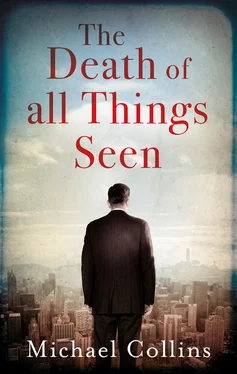Or perhaps he was overthinking it. Maybe it was his sense of guilt, his aloneness and disconnectedness from life when he was writing. Or maybe all Chinese were like this, the billion faces so absolutely the same, or apparently so from Norman’s perspective, if he could submit to such an idea without racist intent — it was hard deciding.
*
In truth, losing Kenneth was a burden lifted, a feeling that eclipsed most everything else going on around him, a self-imposed austerity measure like how it felt to cut up your credit cards, as attested to by the honest folk who talked on the conservative radio stations about assumed personal responsibility as a quasi-religious atonement for wrongful purchases, and how there was nothing wrong with America or capitalism. It was the people who needed to atone and make amends.
There was a new beginning. He felt it everywhere, in the sweep of change, in the simple pronouncement of ‘Yes we can!’
As evidence, he had ventured out into the cold dark of a Chicago night in early November, holding Grace’s hand as the throng pressed down on Grant Park, to experience the rousing sense of history being made, John McCain, distinguished and decorated former prisoner-of-war, unable to overcome the rainbow coalition of minorities unsettled by the lies which had led to war in Afghanistan and Iraq and the collapse of the economy.
Norman consigned his parents’ deaths with McCain’s defeat, with the passing of an era, with a generation that had served and died for the American cause. It was not that Norman didn’t care, or that the nation wasn’t thankful or respectful. It was just that certain types, certain histories, mattered less in the emerging narrative. In defeat, McCain, like Norman’s parents in dying, quietly surrendered the past to the present.
*
Norman saved his file for the day. At times it was enough for a writer to show up. Turning, he watched in the hallway mirror his live-in nanny’s blue-grey Weimaraner, Randolph, stir and go toward the bathroom. This was part of what he was calling The New Existence . Norman listened to the faint lapping sound of the dog’s tongue drinking from the toilet bowl.
Joanne Hoffmann, Grace’s nanny and Randolph’s owner, was also up and performing a series of contorted Yoga holds in his living room, her flannel pajama bottoms riding low on the spread of her pelvis. Beside her was a tent-like structure — sheets draped over a table in the living room — a conceit that still persisted from when Joanne had first moved in. In observing it, there was the resurrection of a routine, a filling in of life in the vacuum of what had come before. He was not fully reconciled with what it all meant, but it was part of The New Existence .
Norman had hired Joanne on New Year’s Day, Joanne, his neighbor, fallen on hard times. Her long-term partner had dumped her. Norman had learned the disconsolate details on New Year’s Eve in the apartment hallway as Joanne was coming out to walk her dog.
She’d mentioned her separation with an oblique apology related to the fights that had raged in the final weeks before her break-up. Fights Norman ‘must undoubtedly have overheard’. He hadn’t, but he had felt obliged to pretend he had, to respect the implosion of what he learned had been a long-term relationship.
He learned it all in one long sentence, how management had been disinclined to extend her lease, her credit shot. She wasn’t working. She confided she was considering returning home for good, but there was a family complication. She stopped abruptly. She had a dresser and an antique table, family heirlooms, on Craigslist, priced to sell. She asked if Norman might be interested. She could show him after Randolph was let out.
At midnight they rang in the New Year together, Joanne, in the minutes before, removing cellophane from a tray of cheeses, crackers and dips Norman had bought in the eleventh hour of the dying year. He dusted off two champagne flutes, opened a bottle of champagne, so it was done just in time, the clink of glasses after the ball dropped at Times Square, each counting down the seconds, each standing at a distance, watching the television, whereafter, Joanne produced a joint from the turned-up cuff of her cardigan. She grew her weed on a windowsill in a makeshift window box greenhouse.
Back in the living room, Norman talked about Grace’s adoption, the trip to China, ending with the eventual undoing of his relationship with Kenneth and Grace’s delay in speaking. Joanne, in turn, talked about her ex-partner. They toasted with an understanding of their own shortfalls and an emphasis on their partner’s failings. It was good to talk.
It helped that Norman had tangentially known Peter Coffey, a pedantic, long-standing post-doc, who, as Joanne explained, after a dissolute eternity as adjunct faculty, had finally gained a tenure track position at a small community college in Oklahoma. At the time of his departure, he was already dating a former student. He took the girlfriend with him, not her. Joanne described Coffey as a second-rate poet, and, truth be told, a poet with a small penis, but then wasn’t that what was behind most bad poetry?
Under the influence of liberally poured wine and pot, Norman learned that Joanne could become truculent. She had a way of scrunching her nose when she got mad, absentmindedly rimming her wine glass in a circular motion, her eyes glossing with a deepening hurt.
*
Norman turned to his computer again. He pulled up the website for the realty agency he had contracted to offload his parents’ house. He had not gone out to the house. He simply wanted it gone. He stared at the low-res feed of his childhood home on the realty’s Virtual Walk-Thru. A grainy fisheye sweep of a wavering feed stalled in the hallway. To go any further required an email address. It said so in a pop-up window. Then another pop-up offered financing options — three- and five-year arms, balloons, variable and fixed rates, a flashing banner indicating Bad Credit Isn’t a Problem , a legacy banner, pre-financial meltdown. There were, of course, no such loans anymore.
Another flashing pop-up offered a trial membership in FreeCreditScore.com, the pop-ups reminiscent of garish billboard signs he had seen on a trip taken in his early adolescence with his parents along Route 66. At the time, the roadside motels were already diminished in the way Hitchcock had prophetically anticipated, so that, much later, Norman, in looking back on it, would understand that Psycho ’s deceptive genius was not the shock of Janet Leigh’s shower scene murder, but something further reaching, more innominate — the death of the American love affair with the car and the open road, and, with it, a certain aimless, transient freedom that had allowed snake oil salesmen to pitch their wares town-to-town in the shadowy in-between of promise and despair.
There were, among the greats, many ways to tell a story. Truth had to be played like a good poker hand, concealed until the end, though what he feared most was that freedom and understanding had been eclipsed, so there was only sensationalism and no substance anymore. Maybe that was just the lament of the pedantic, the contrarian, the literalist, the fate of the Chicken Littles of the world.
In staring at the jittery images, in inhabiting what had been his former life, Norman was reminded of the opening scenes of Titanic , the modern submersible sending back a grey feed of pictures from beneath the Atlantic to the aged heroine. That was the genius of Art, its power to encapsulate, in the case of Titanic , to apprehend the great folly of human hubris that had so defined the age — the push across the Atlantic at breakneck speed for the record, icebergs-be-damned, along with all on board — the film’s essential allure, everyone on board living the last days of their lives and not realizing it, while everybody watching did.
Читать дальше












